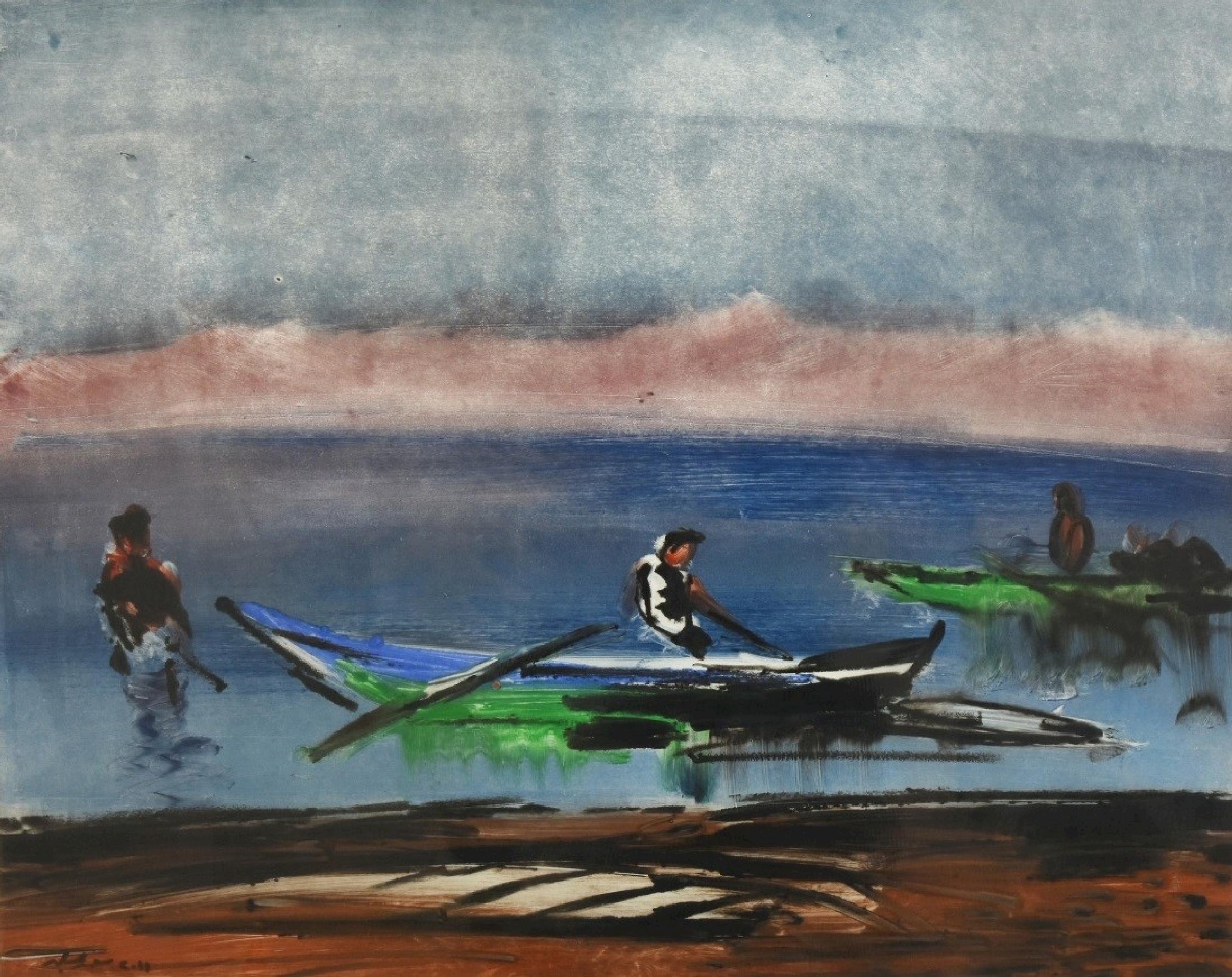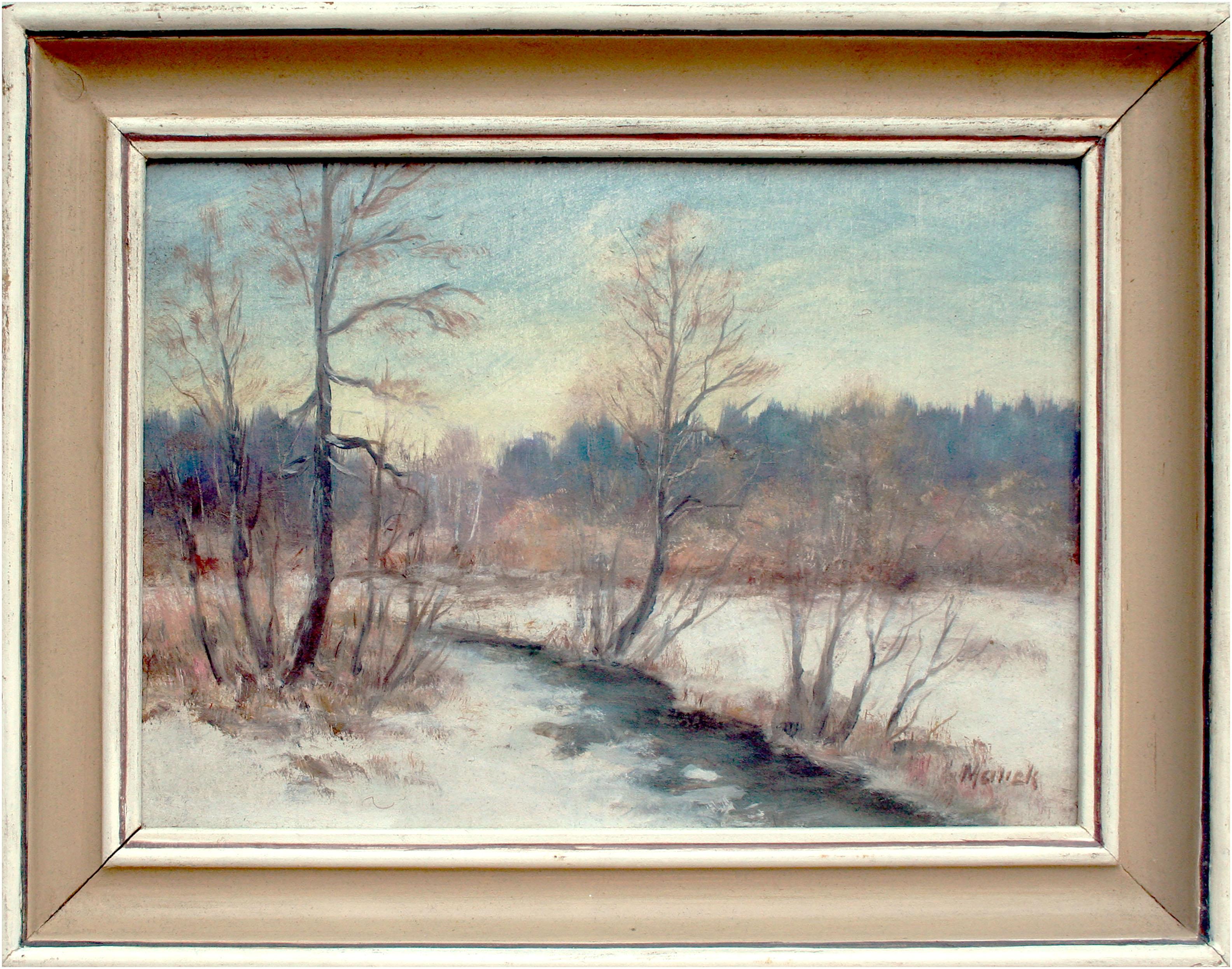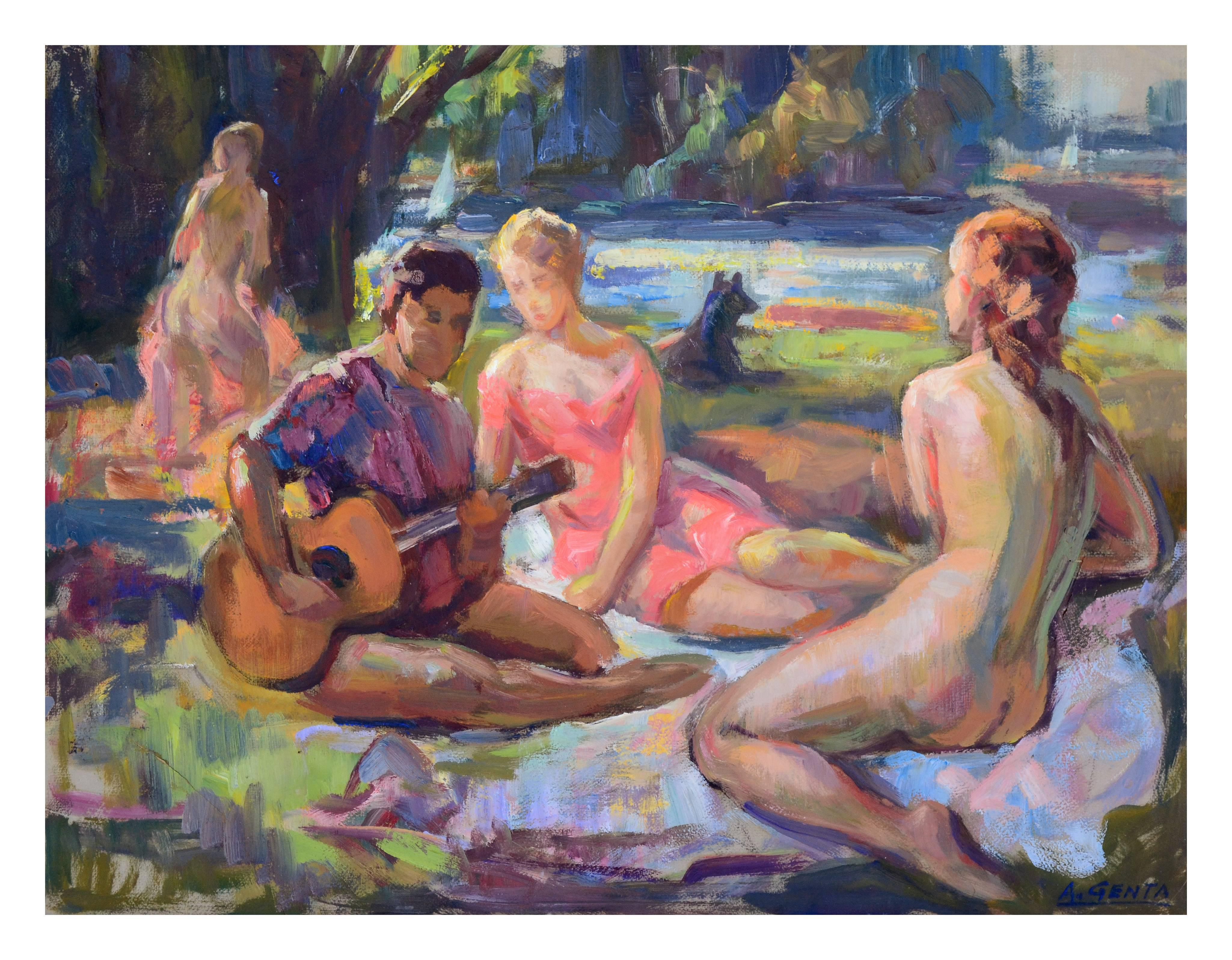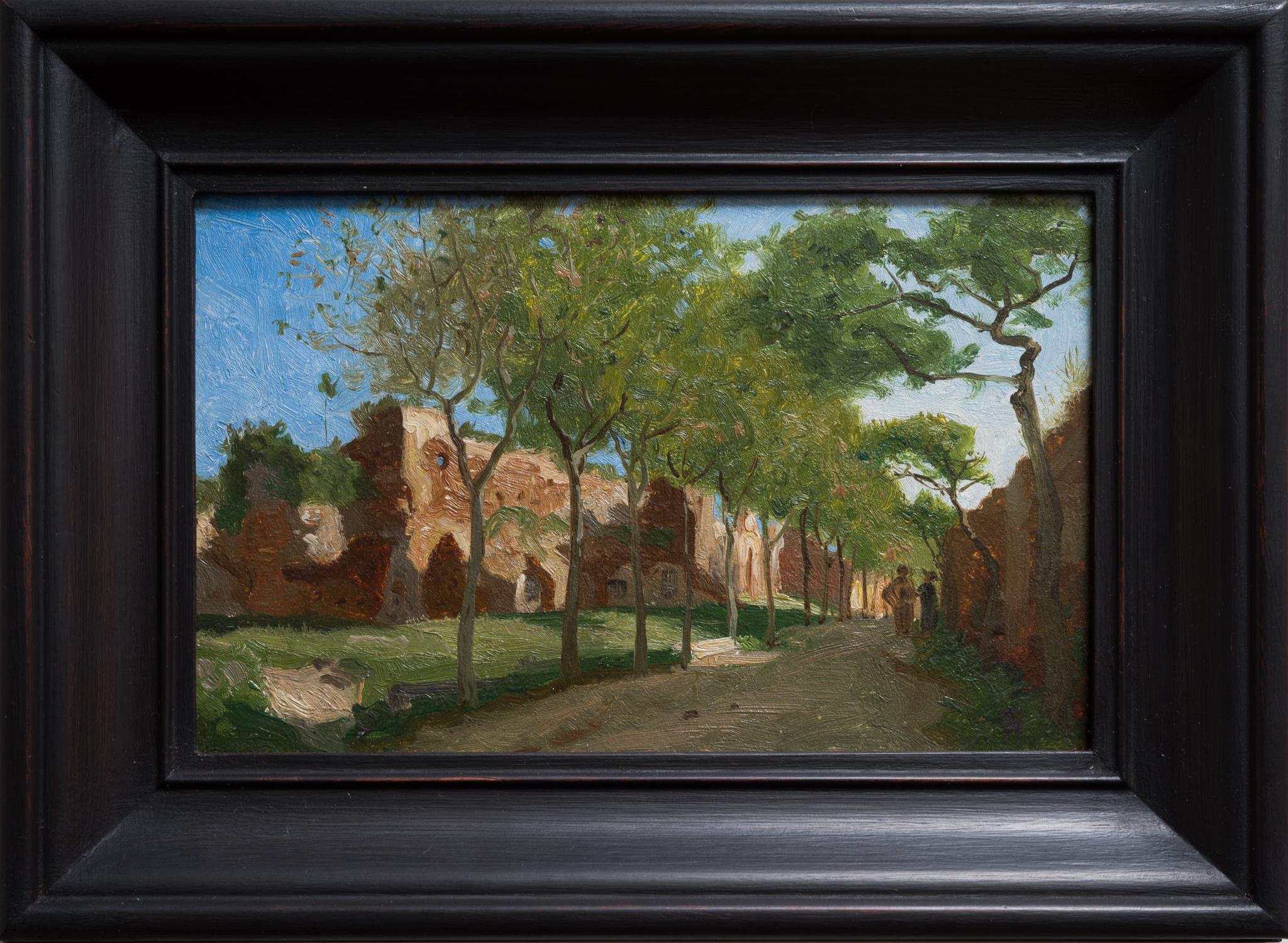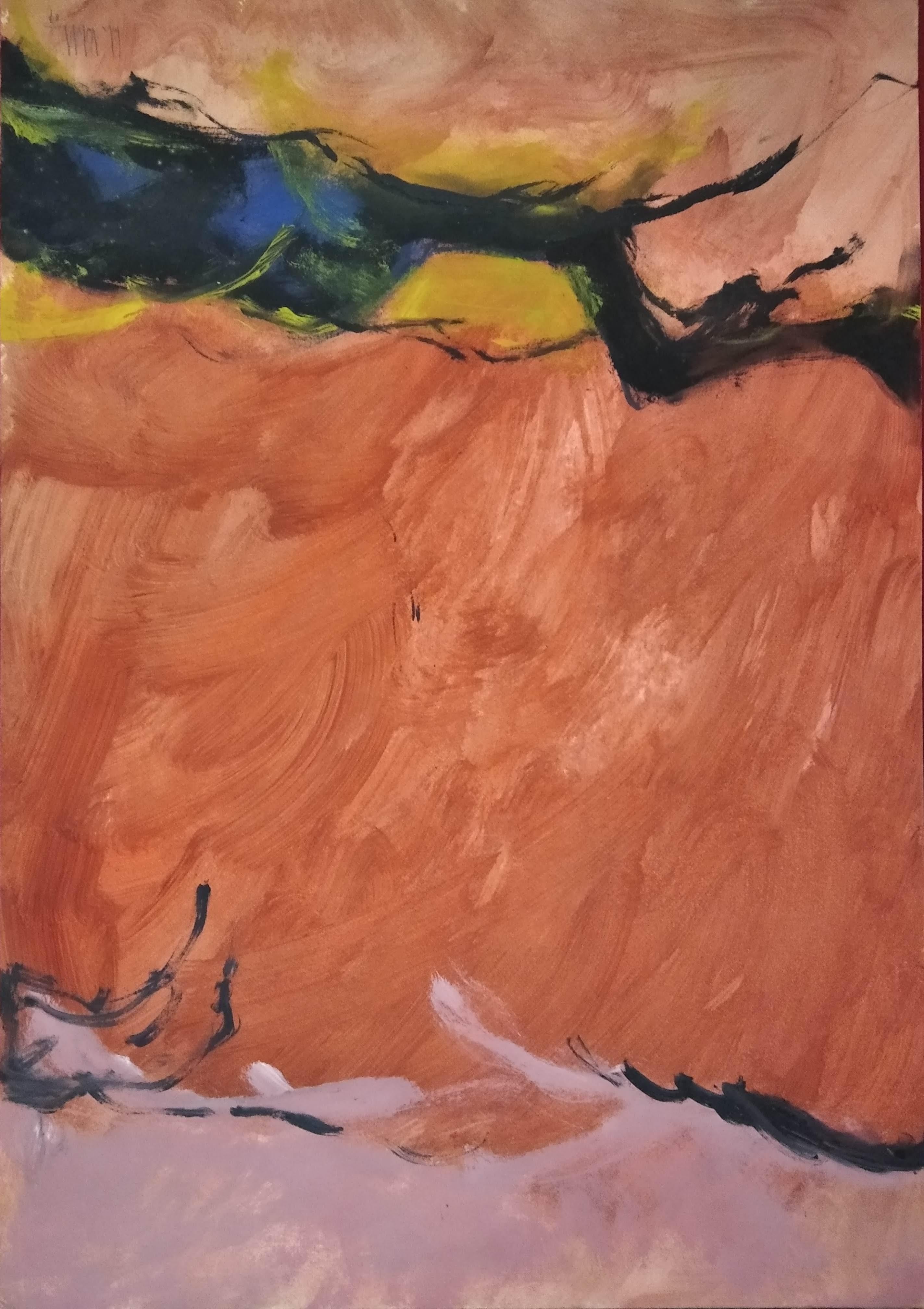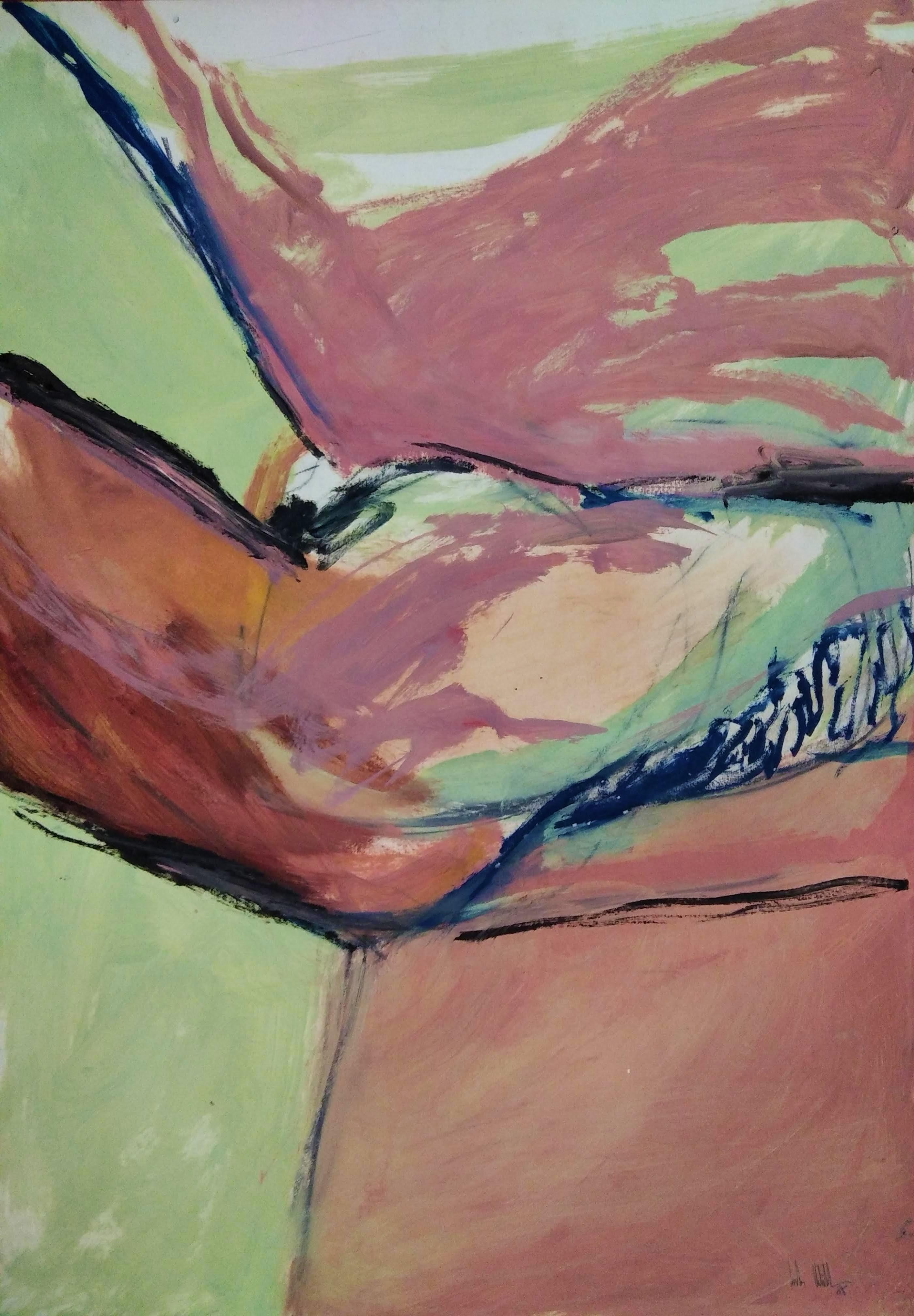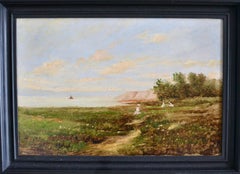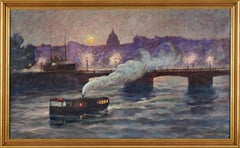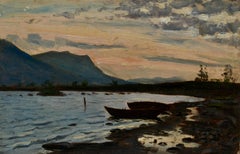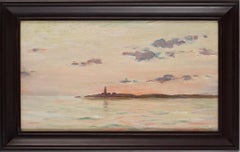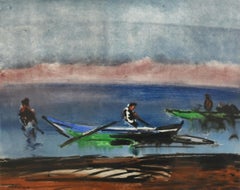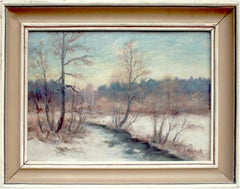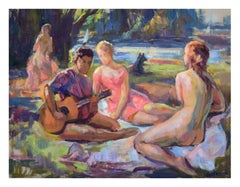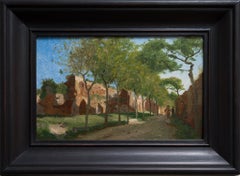Items Similar to Ariccia and The Alban Mountains
Want more images or videos?
Request additional images or videos from the seller
1 of 10
Joachim Ludwig BünsowAriccia and The Alban Mountainscirca 1853
circa 1853
About the Item
View of the Ariccia Bridge and the Alban Hills
This finely executed plein air landscape depicts the monumental bridge of Ariccia and the town with the surrounding Alban Hills, painted by German landscape artist Joachim Ludwig Heinrich Daniel Bünsow (born 1821 in Kiel, died 1910 in the same city). Executed in oil on paper mounted on cardboard, the work dates from his Italian period between 1853 and 1858.
Bünsow received his artistic training at the Royal Danish Academy of Fine Arts in Copenhagen from 1839 to 1848, studying under Johann Ludwig Lund and Christoffer Wilhelm Eckersberg. In 1844, the Copenhagen Art Association acquired his painting "Tellingstedt in Dithmarschen." Following his studies, he traveled to Dresden, where he became associated with the circle around Johan Christian Dahl. A scholarship from the Copenhagen Academy enabled Bünsow to reside in Rome from 1853 to 1858. During this period, his landscapes evolved from the finely toned, naturalistic style of his early work to more atmospheric and idealized compositions, influenced by Louis Gurlitt.
Bünsow's early works from his time in Copenhagen are characterized by fine tonality and naturalistic rendering, reflecting the style of his teacher Christoffer Wilhelm Eckersberg. His Italian landscapes, however, exhibit a more atmospheric and idealized approach, influenced by Louis Gurlitt. Notably, Bünsow produced high-quality drawings during his time in Rome, some of which are preserved in the Kunsthalle zu Kiel.
Historical Context: The Ariccia Bridge
In the early 19th century, the local authorities sought to improve the Appian Way's safety and accessibility. The solution involved constructing bridges to span the Ariccia valley and adjacent ravines. In 1843, Pope Gregory XVI commissioned a six-arched bridge to address the elevation differences. Following his death in 1846, Pope Pius IX continued the project, entrusting architect Ireneo Aleandri with the design and Giuseppe Bertolini with the execution.
Completed in 1854, the bridge stands as a significant 19th-century engineering achievement. Featuring three tiers of elegant neoclassical arches inspired by Roman art, it measures 59 meters in height and 312 meters in length. Travertine columns at both ends commemorate the Roman milestones of the ancient Appian Way. Pope Pius IX inaugurated the bridge, opening it to all wheeled vehicles.
In 1944, retreating German forces destroyed the bridge to impede Allied advancement. Reconstruction commenced in 1946 under the guidance of Carlo Cestelli Guidi, with architectural consultation from David Pacanowski. The bridge was reopened in 1948.
Provenance
This painting has remained within the Bünsow family since its creation. It was housed in the Bünsow House in Stockholm, constructed between 1886 and 1888. Fredrik Bünsow, the son of Joachim Johann Friedrich Bünsow (Joachim Ludwig's brother), was a prominent industrialist and businessman in Stockholm. Photographs of the family palace, including interior shots displaying other Bünsow paintings, are included. The artwork has been passed down through the family until 2023.
Joachim Ludwig Heinrich Daniel Bünsow hailed from a family with a rich artistic heritage. His father, Joachim Johann Friedrich Bünsow, was a portrait painter and drawing instructor. His grandfather, Christian Friedrich Joachim Bünsow, was also a painter and drawing teacher. The Bünsow family's contributions to art spanned several generations, with members active in both Germany and Sweden.
Measurements given are without frame. Frame is later.
- Creator:Joachim Ludwig Bünsow (1821 - 1910, German)
- Creation Year:circa 1853
- Dimensions:Height: 11.23 in (28.5 cm)Width: 17.33 in (44 cm)Depth: 1.19 in (3 cm)
- Medium:
- Period:
- Condition:The painting is in very good condition. The surface has recently been cleaned. Frame is later.
- Gallery Location:Stockholm, SE
- Reference Number:1stDibs: LU2608216409992
About the Seller
5.0
Platinum Seller
Premium sellers with a 4.7+ rating and 24-hour response times
1stDibs seller since 2023
15 sales on 1stDibs
Typical response time: <1 hour
- ShippingRetrieving quote...Shipping from: Stockholm, Sweden
- Return Policy
Authenticity Guarantee
In the unlikely event there’s an issue with an item’s authenticity, contact us within 1 year for a full refund. DetailsMoney-Back Guarantee
If your item is not as described, is damaged in transit, or does not arrive, contact us within 7 days for a full refund. Details24-Hour Cancellation
You have a 24-hour grace period in which to reconsider your purchase, with no questions asked.Vetted Professional Sellers
Our world-class sellers must adhere to strict standards for service and quality, maintaining the integrity of our listings.Price-Match Guarantee
If you find that a seller listed the same item for a lower price elsewhere, we’ll match it.Trusted Global Delivery
Our best-in-class carrier network provides specialized shipping options worldwide, including custom delivery.More From This Seller
View AllLandscape with Women Picking Flowers, Possibly on Island of Mön
Located in Stockholm, SE
A fine small plein air study of three women picking flowers on the meadow next to white cliffs and sea. In the horizon where the sky ends, the contours of mainland is visible as a sh...
Category
Late 19th Century Naturalistic Landscape Paintings
Materials
Paper, Oil, Cardboard
Sunset Over Stockholm with Steamboat
Located in Stockholm, SE
A magnificent view of Stockholm, featuring a steamboat gliding slowly passing by Skeppsbron, (the bridge) with Södermalm and Katarina Church illuminated in the soft light of dusk. Th...
Category
1920s Art Nouveau Landscape Paintings
Materials
Canvas, Oil, Cardboard
Swedish Sunset over Lake and Mountains
Located in Stockholm, SE
Oil study by a lake and mountains during sunset by Edward Rosenberg (1858-1934). This is a an oil study for a larger painting that Rosenberg did. A te...
Category
Early 20th Century Naturalistic Landscape Paintings
Materials
Canvas, Oil, Cardboard
Hållö Lighthouse, Smögen at Sunset.
Located in Stockholm, SE
Serene sunset over the waters near Smögen on Sweden's west coast, with the sun setting just behind the island of Hållö and its lighthouse by female artist Ingeborg Westfelt-Eggertz. ...
Category
1890s Impressionist Landscape Paintings
Materials
Canvas, Oil
Sunset over Dyrehaven. Oil on Canvas, 1860.
Located in Stockholm, SE
Carl Frederik Aagaard, Sunset over Dyrehaven. Signed C.F. Aagaard. Oil on canvas laid on card box panel. 22×32 cm without frame. A tergo written:...
Category
1860s Naturalistic Landscape Paintings
Materials
Canvas, Oil
American Poplar
Located in Stockholm, SE
A vibrant painting depicting an avenue lined with poplar trees in fall colors, prominently featuring a very large, centrally placed yellow poplar. Possibly an American poplar. The artist, Agda Holst, has employed a diverse palette of colors to the poplars, creating a dynamic and colorful composition. This oil on panel is signed and dated by Holst in 1948. The work exemplifies her use of color and form, characteristics that defined her artistic practice throughout her career.
Agda Holst was a Swedish modernist painter known for her precise study of form, stylized compositions, and ability to merge structured geometry with expressive color. Her works, often still lifes, portraits, and figure studies, reflect a balance between naturalistic representation and modernist influences such as Cubism and New Objectivity.
Holst's artistic journey began in 1907 at the Académie Colarossi in Paris, where she studied under Christian Krohg. Seeking further refinement, she moved to Munich between 1910 and 1911, studying with Julius Exter, known for his teachings in portrait and genre painting. In 1911–1912, she returned to Paris to study under Kees van Dongen, whose bold use of color and strong contrasts left a lasting impression on her work. The early 1920s marked another period of study in Paris, this time under André Lhote, who instilled in her a structured approach to composition and geometric clarity.
Holst’s first public exhibition took place in 1916, when she displayed paintings in a bookstore...
Category
1940s Expressionist Landscape Paintings
Materials
Oil, Panel
You May Also Like
"Fishermen" Landscape Painting 20" x 25" inch by Mohamed Abla
By Mohamed Abla
Located in Culver City, CA
"Fishermen" Landscape Painting 20" x 25" inch by Mohamed Abla
Mohamed Abla was born in Mansoura (North of Egypt) in 1953. There he spent his childhood and finished school. In 1973 ...
Category
21st Century and Contemporary Contemporary Landscape Paintings
Materials
Paper, Oil, Cardboard
1970's Winter Landscape -- River in the Snow
Located in Soquel, CA
Beautiful winter landscape of the snow covered countryside by an unknown artist (American, 20th Century). Signed "Mallek" lower right. Displayed in a painted rustic frame. Image, 7"H...
Category
1970s American Impressionist Landscape Paintings
Materials
Paper, Oil, Cardboard
$300 Sale Price
20% Off
Picnic in the Park - Mid Century Figurative Landscape
By Albert Genta
Located in Soquel, CA
Gorgeous mid century figurative landscape of a a group of figures, sitting on the lake shore with a guitar by Francis Albert Genta (French, 1901-1989), c.1950. Signed "A. Genta" lower right. Unframed. Image size: 18"H x 24"W.
Albert Genta was born in Paris, France in 1901 and is primarily known for painting female portraits and landscapes. Albert Genta (Francis Albert Genta) is a painter French specialist naked , born 13 September 1901 in Paris 12th and died on 5 September 1989 in the 20th, Paris .
He was a female nude painter...
Category
1950s Abstract Impressionist Figurative Paintings
Materials
Cardboard, Oil, Paper
$1,480 Sale Price
20% Off
Oil Sketch From Rome Called Ruins of Ancient Rome, c. 1870-72
Located in Stockholm, SE
This beautiful oil sketch, painted en plein air, was created by Swedish artist Olof Arborelius during his stay in Italy from the fall of 1870 until January 1872. The painting features a charming depiction of ancient Roman ruins—either a city wall or an aqueduct—surrounded by lush trees under the clear Italian sky. With loose brushstrokes and a soft, atmospheric touch, the artist captures the natural light and Mediterranean ambiance, demonstrating his profound understanding of plein air painting.
Arborelius was heavily influenced by French artistic trends of the time, particularly in his color sensitivity and study of light and air. His time in Italy was critical for his artistic development, marking the height of his mastery in capturing the delicate interplay of light, color, and atmosphere.
Several of Arborelius’ Italian oil studies, including similar small-format plein air works, were later exhibited at various prestigious exhibitions. These include the Svenska konstnärernas förening memorial exhibition in 1910, the Svensk-Franska Konstgalleriet in Stockholm in 1931, and a memorial exhibition at the Nationalmuseum in 1943.
Viggo Loos praised Arborelius' Italian studies for their "sensitivity to color" and "intense exploration of light and atmosphere," highlighting these works as a high point in the artist's career. Loos emphasized how Arborelius skillfully captured the essence of the Mediterranean landscape, using vibrant tones and delicate brushwork to convey the interplay of light and air.
Moreover, Folke Holmér, the curator of Arborelius’ 1943 memorial exhibition, described his Italian sketches as some of the most painterly pieces of his early production, worthy of comparison with the best works Swedish artists had produced in Italy.
Among his notable works in major collections are three of his Italian oil studies held at the Nationalmuseum: View from Rome Towards the Arch of Septimius Severus...
Category
1870s Impressionist Figurative Paintings
Materials
Paper, Oil, Cardboard
Después del desierto
Located in Barcelona, BARCELONA
Includes a Certificate of Authenticity
Category
1980s Abstract Abstract Paintings
Materials
Paper, Oil, Cardboard
Untitled
Located in Barcelona, BARCELONA
Includes a Certificate of Authenticity
Category
1980s Abstract Abstract Paintings
Materials
Paper, Oil, Cardboard
